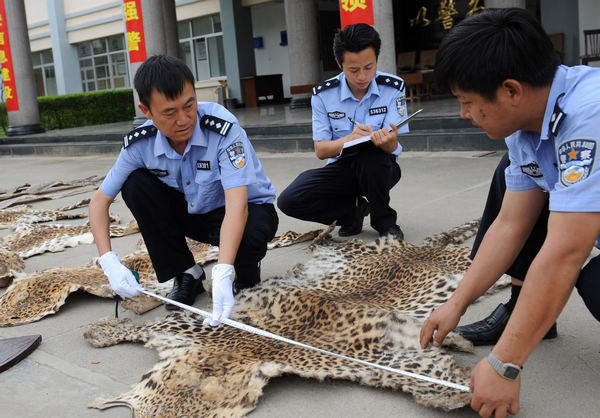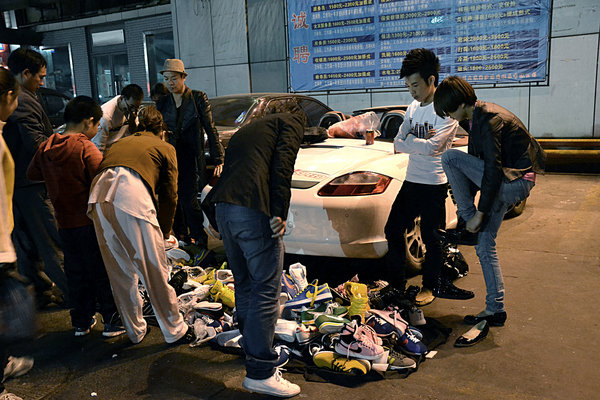Society
- Details
- By David Cao
- Hits: 1023

China Railway's 48019 train run off tracks in Zhang-Quan Railway at 22:25 18th October 2011. There is no injury report yet. From 23rd July of this year, this is the second major accident in 3 months.
- Details
- By David Cao
- Hits: 735

Dong Jianchuan, director of the forest security bureau in Dehong prefecture of Yunnan province, measures the length of a smuggled leopard fur with his colleagues earlier this month.
Criminals in Yunnan, in southwestern China, still hunt and traffic many black bears and various rare turtles, snakes, monkeys and bird species.
But the number they are killing or capturing in Yunnan has decreased greatly in recent years, according to a senior police officer.
Read more: Wildlife smuggling becoming rarer in China but not extinct
- Details
- By David Cao
- Hits: 879

Shoppers buy sneakers sold from the back of a Porsche sports car in Hangzhou city, capital of East China's Zhejiang province, Oct 19, 2011. The young man transported the pile of sneakers in his luxurious car and joined a group of street vendors at night, attracting a lot of attention. About 450 kilometers from Hangzhou, Wenzhou city, another Zhejiang province's economic hub, has been hit by a severe debt crisis with at least 80 business people reported missing, committed suicide or declared bankruptcy. Some people suffering hard times are selling their property to balance their deficit.
- Details
- By David Cao
- Hits: 732
I caught the last three days of the prêt-a-porter season in Paris. It felt rather a novelty to be arriving fresh and keen while other fashion editors were visibly wilting and grumbling about the heat and overall lack of tickets due to the emergence of the all-important Chinese fashion pack.
Having just finished my third article about the rising importance of the Asian Pacific customer, I had expected to find perhaps some evidence of the startling statistics I've sifted through of late, such as Prada's 74.2 per cent jump in profits in the past six months, or Burberry's buyback of directly owned shops in the region, which accounted for 60 per cent in its recent 34 per cent rise in sales.
Seemingly overnight, China has become the biggest market for fashion brands, including Gucci and MaxMara, the latter with a whopping 300-shop presence in mainland China alone.
Then there's the opening of Louis Vuitton's new emporium in Singapore, which can only be reached via boat or bridge, a show of force by the French luxury giant as to where its loyalties now lie.
Or, the Chanel Culture "rolling" exhibition, soon to arrive in Beijing after making its debut this summer in Shanghai.
On the catwalks, around one third of all models in shows I saw were of Far Eastern descent.
- Details
- By David Cao
- Hits: 988
Five people have been arrested in Shanghai for making and selling fake iPhones.The five were part of a gang who specialise in counterfeiting Apple products, The Guardian reports.
According to the police report, components for the 'iPhones' were bought from Guangdong in the south of China, and assembled in Shanghai; the gang was using a rented apartment as its "manufacturing" facility. The production costs were about £200 (2000 yuan) but the iPhones were sold on the black market for twice that price, still cheaper than the real iPhones.
Oddly enough, between the 200 iPhones found by the police there were several "hiPhone 5" handsets copied from leaked images and rumours surrounding the release of the iPhone 5.
More Articles …
Page 62 of 255